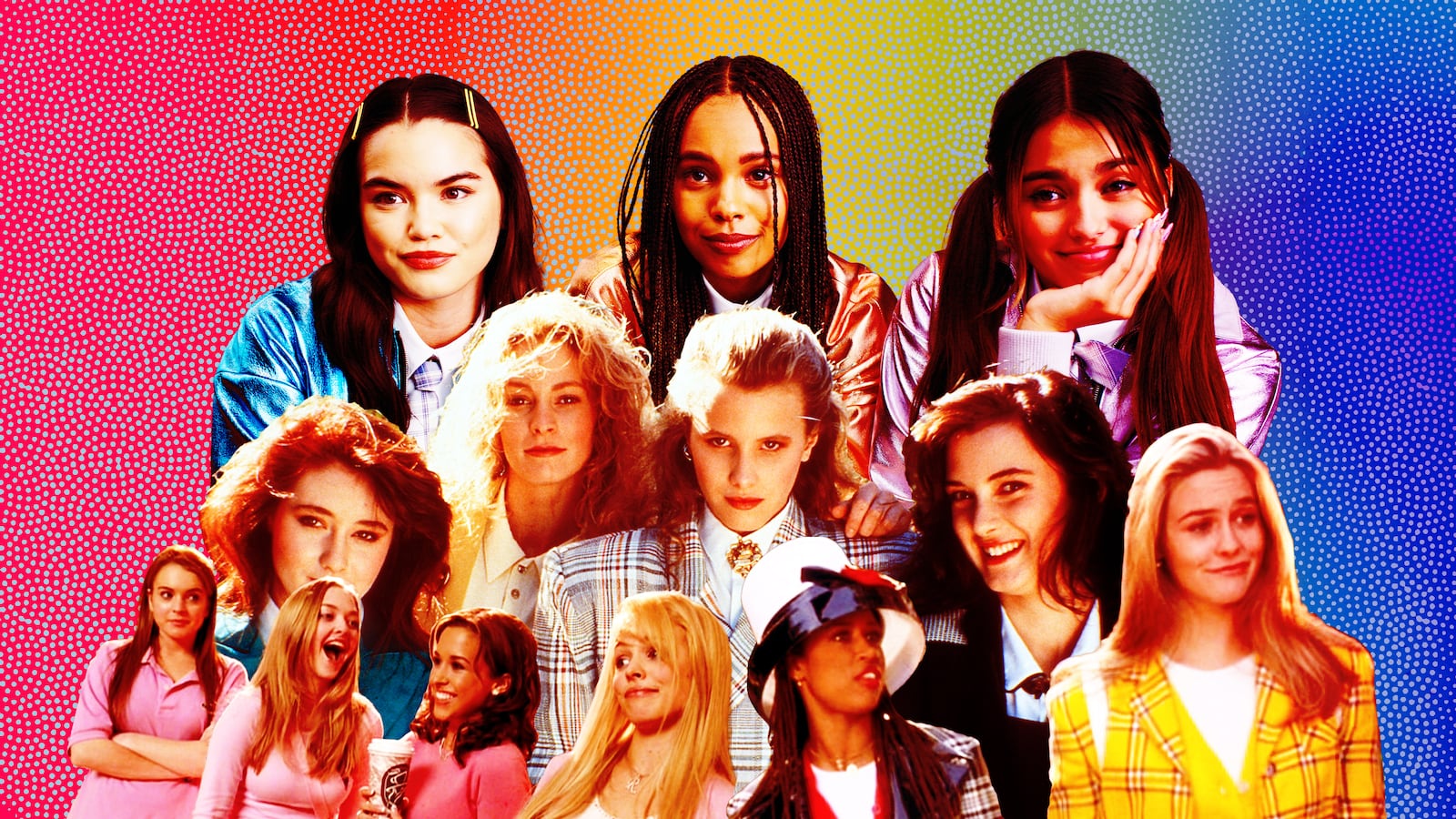The name on everybody’s lips is currently “Gen Z.” Perhaps the most over-defined, over-marketed, and over-exposed generation in human history, everyone wants a piece of us (word to Britney). When social media supplanted TV as the primary form of youth media, it rapidly eroded lines between different media-consuming communities. Now, wherever we go, the rest of the world follows—from our exodus from Facebook to Instagram as tweens, our affair with Snapchat as teens, and our dominance of TikTok as young adults.
But the “we” in question is something that’s tricky to define. Many of the trends and stock phrases attributed to Gen Z are recycled from other cultures’ creations and phenomenons, and AAVE in particular. Gen Z absorbs them all, then replicates them ad nauseam across the web; millennials ape it, and corporations follow in their lead. Thus is the circle of a digitally led life.
The corporations in question include those that drive the entertainment industry, of course. This year has seen many forms of entertainment attempt to be Gen Z’s definitive chronicler (while reaping in the bucks for doing so)—think recent films like Bodies Bodies Bodies and Not Okay, the TV show Heartbreak High, and the newly released Netflix movie Do Revenge. And one of the primary Trojan horses that they all use, in their attempts to ingratiate themselves with the target audience, is language. To talk like Gen Z is to get Gen Z, or so the people throwing money at teen and twenty-something-focused media believe.

Bodies Bodies Bodies.
A24To understand youth culture and its lingo, aspiring Gen Z-ologists often rely on the holy trinity of modern media consumption, the Three Ts: Twitter, TikTok, and Tumblr. Bodies Bodies Bodies’ trailer staked its claim as a Gen Z™ tale by firing off a series of quick cuts betwen buzzword-laden phrases pulled from social media discourse: “You’re always gaslighting me,” “You fucking trigger me,” “You are so toxic,” and “You’re silencing me.”
All of these buzzwords have traveled some serious mileage on the Three Ts. Despite drawing on mental health terminology, they’re almost always used in situations that have nothing to do with mental illness—trigger warnings and misogynistic behavior are easily invoked for hyperbolic, intense effect.
At least the movies that borrow these phrases are self-aware about their misappropriated-to-the-point-of-meaningless usage. Bodies Bodies Bodies points this out as one character scoffs at a gaslighting accusation, firing back that the accuser lifted that term from the internet and deployed it meaninglessly.
Bodies Bodies Bodies is far from the only film to center this type of language in its interpretation or critique of Gen Z. The trend of forcing these social media-associated phrases into characters’ mouths especially glared at me while watching Do Revenge, perhaps more than ever. The film has an admirable goal of framing itself as the 2020s answer to the iconic, snappy teen comedies of yesteryear, ones with eminently quotable scripts like Heathers and Clueless. But despite making reference after reference to these films, Do Revenge focuses too much on doing the “saying” rather than the “doing” itself. It positions itself in relation to these iconic films, rather than making itself one, with the dialogue largely to blame.
A very key—and underrated—part of what makes the teen classics Do Revenge pays homage to so reference-worthy is how they defined the teen culture of their time. They created and contributed to rather than completely lifted from it, redefining how viewers spoke instead of the other way around.
A movie as sardonic as Heathers endures largely because of its incredibly quotable, uniquely syntactic dialogue. (We will not speak of its horrid, short-lived TV reboot.) The film’s iconic lines are still re-popularized every year, in large part via screencaps recycled from 2012-era Tumblr. I don’t think there’s anyone who’ll argue that "How very," "Fuck me gently with a chainsaw," and "What's your damage?" were the teen lingo en vogue at the time of Heathers’ 1988 release. But if you hear any of these lines now, you immediately think of the pitch-black sense of humor that defined Heathers, and vice versa. And given my generation was not alive at the time, they also define our impression of that period’s teens.
Meanwhile, Clueless's "As if" originated in the LGBTQ community—and there's a further conversation)" href="https://urldefense.com/v3/__https://www.teenvogue.com/story/clueless-as-if-amy-heckerling__;!!LsXw!UPXFgqPv3UoG_jDQz-Tkf9_pxE1YYcWkk563jbzXUsrE8XjdxDK88BVp65vih60KTLL-tpu30ZgIpn74Tj6aHb1fhtlCXxsJ$">conversation to be had about its dissemination into the mainstream via the film—but it was not a part of the popular lexicon until the film's 1995 release. Now, it’s remembered as a classic piece of ’90s lexicon. When you think of Clueless, you think of Alicia Silverstone and Stacey Dash’s iconic plaid outfits, sure—Do Revenge definitely did—but you probably hear the aforementioned quote while envisioning them. I’ve never owned a plaid skirt suit, but I’ve deployed “as if” more times than I can count. The costuming set the scene, but it was the movies’ language that rippled across decades of youth culture in a very imitable way.

Clueless.
Paramount PicturesBoth films deployed these phrases so casually that they stuck out even more. They were such unique interpretations of teenage-speak that real-life teens—even to this day—want to emulate the vibes and vocabularies of those movies’ depictions. They were creative and brought something fresh into the lexicon of young people.
Trying hard to include a line that will catch on the kids is something that 2005’s Mean Girls, another member of the teen canon, even poked fun at, with the meta-invention/attempted popularization of "fetch." Unlike “fetch” in the Mean Girls universe, the mass adoption of these teen movie vocabularies was organic, unlike the algorithmically crafted “viral moment” of Do Revenge’s biggest quote: “Peaking in high school is cringe anyway.” Give me 10 minutes, and I’ll find that exact sentiment expressed by 20 different young people on one of the Three Ts.
What’s frustrating is that when Do Revenge focused on the “doing”—such as with its brilliant third-act plot twist—it struck me as a smart, on-the-pulse interpretation of today’s youth culture. After the twist was revealed, I immediately texted my friend a flurry of praises for the film, demanding that she watch it so that we could discuss its entry into the teen movie firmament. We’d finally done it, Joe. Juicy, thrilling, and morally dubious at best, I felt hope for the future!
But at the end of the climactic comeuppance scene where the “fake woke-misogynist” boyfriend is exposed, one of the characters snarkily says, “Don’t let the patriarchy hit you on your way out,” and I was slammed back down to earth.
Do Revenge’s tendency to pluck from the terminally online teenager-speak of today robs it of the chance to offer a unique, idiosyncratic take on youth culture, the kind that defined movies they want to emulate. An overconfidence in its understanding of Gen Z prompts Do Revenge, and other films like it, to constantly wink at the audience through their Twitter-collated dictionaries. “We love an emotional terrorist” and “It’ll be like our very own version of friendship tattoos, except, you know, with trauma” are just two more instances where Do Revenge’s script pointedly attempts to hammer home how well the movie knows Gen Z and how equipped it is to poke fun at them.
But that confidence is unearned, as it reduces teenager-dom to a very specific slice of the population engaging in a very specific media sphere. Who knows how long the trendy terminology of today will last? When it finally fades away, Do Revenge’s language will find itself immensely dated and is not likely to resonate with the not-yet-born future teenagers who will stumble upon it.

Heathers.
Image EntertainmentYes, nearly every member of Gen Z is on social media. We all know these often misunderstood, un-contextualized, annoyingly deployed social justice-oriented terms, and we have seen them get over-used in action. Everyone with an opinion on youth lingo has already made their take known, from the pundits to the young people themselves. After all, that is the point of social media: to overshare one’s granular opinions on literally anything, because of an over-inflated sense of self-importance or a burning desire to develop some.
I understand that the point of satire is to hold a mirror—or in this case, whatever the audio version of a mirror would be—to society, in order to create a cultural history of the times. But the way that these new teen movies satirize their target audience reflects a fundamental misunderstanding of what made its influences so successful. Heathers wasn’t the world I already lived in; it was a place I wanted to escape to, where the teens dressed so casually cool and dropped witticisms I couldn’t wait to steal for myself. Why would I want to buy into a world full of people saying the exact same thing as any given social media feed, in the exact same way? If I wanted that, I’d just hop on TikTok.
Imagine if movies from the late-2000s and early 2010s obsessively invoked “live, laugh, love”-era maxims to represent millennials. It would be insufferable! But today’s fictional media about Gen Z can’t resist falling on generational stock phrases, much to everyone’s detriment. It becomes even more dubious when media inevitably canonize phrases that are blatantly not “Gen Z” or “internet speak,” but that then become institutionally attributed to them rather than to their actual originators—which are often marginalized communities.
When I look back on the films of my teenage years/early ’20s, I’m not sure that there’ll be any media not wholly defined by The Three Ts. I believe my generation's future nostalgia deserves more than a voice note-like reflection of social media. As a generation that’s been coming of age in an “upcycled” culture, a culture that had its development arrested by a global health crisis, we deserve a cinematic glossary to call our own.






